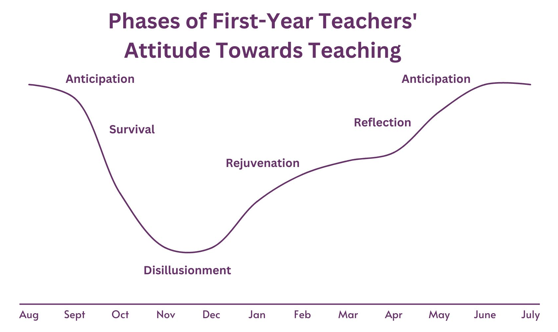ALI Staff | Published January 25, 2023
Whether fresh out of college or entering teaching as your second career, these tips will guide you in making the most of your first year of teaching and help you carve out your place in your new career.
We polled some of our teachers and former teachers on what important information they would share with those just beginning their careers.
Here are the top 8 tips that every first-year teacher should know.

Tip #1: COMMUNICATE WITH PARENTS
Communication is key. Whether with colleagues, administrators, parents, or students– having an open line of communication will help avoid misunderstanding and any other challenges that arise from miscommunication.
Communicating with parents can be intimidating for new teachers. However, more often than not, parents just need an opportunity to vent and ask questions. They will appreciate updates on how their child is doing in class. All of this contributes to your reputation as a teacher.
Teachers talk, students talk, and parents talk– and soon, you’ll be known as the teacher that's easy to communicate with.
Teacher Pro Tip: Make a habit of reaching out to parents when their child does something positive. Calling home doesn’t always have to be to discuss something negative.
You’ll be able to hear how surprised parents are when hearing about their child’s achievements. If nothing else, parents will know of your commitment to student success.
Don’t be too hard on yourself. No matter how good you are, you’re not going to have it all figured out in the first year.
There will be many failures, but how you react and build resilience in the face of failure will determine your success as a teacher.
Let students learn from your failures. Every teacher wants to be perfect in front of their students, but that won’t teach kids how to accept their setbacks in life.
Don’t be afraid to own up to mistakes. This is a difference-maker in getting students invested in your class.
A lesson you spent hours planning and coordinating will bomb. It's inevitable. Humanize yourself.
And students will not only learn that you're willing to admit when you’ve messed up, but also they can do the same and not feel shame. It’s the perfect opportunity for growth.
Teacher Pro Tip: Observing other teachers doesn’t stop with student teaching. Want perspective?
Ask to sit in on a veteran teacher’s lesson. Note how they manage the class from the beginning through transitions and wrapping up the lesson. Pay attention to pacing and what they do– visual cues, reminders about time– whatever it is that improves efficiency and keeps everyone on task.
Keep in mind– you’re going to learn a lot this year, but you’ll learn the most from your students.
Turn off email notifications. Seriously, you need to do this.
Perhaps delete your school email from your phone entirely. There’s no need to read that email on a Tuesday at 11 pm. (What are you doing up that late anyway? We’ll cover a tip for that one next.)
You might be thinking… What if I miss something important? Nothing is more important than your mental health. You need a separation between work and home.
But sometimes people give away chairs, desks, etc., via email, and the first to reply will get it.
We know that mini-fridge or two reams of paper is like teacher gold– but is it really worth enduring after-hour emails and reply-alls? The answer is No.
Teacher Pro Tip: Figure out what’s best for you. Maybe you want to work through lunch, so you don’t have to stay late to plan. Determine what works and allows you to be your best self.
This might be the most important tip on this list. Sometimes teaching can feel like an uphill battle.
As teachers continue working hard to make up for lost time and learning loss, the stresses and pressures have increased. It’s crucial that you take the time to recoup mentally and physically. Your body and mind will appreciate it.
Give your all, but remember that you need to be your best self for your students to be the best versions of themselves.
Teacher Pro Tip: Take your personal days. Even though creating sub plans and all the coordinating that goes with being out makes more work– take the day.
Being first in and last out sounds like the peak of professionalism, but it’s just a surefire way to burn out. Don’t neglect your body and mind.
As a teacher, you need to set boundaries. This connects back to Tip #3 and disconnecting, but it can be way more than that. Teachers are known for spending countless hours planning and grading at night and over the weekend. Some teachers come to school as soon as the building opens just to get some quiet time to grade.
For teachers, working through lunch and paying out-of-pocket for classroom supplies seems to be the norm, but we are slowly moving away from that model because it leads to burnout and low job satisfaction.
It’s okay not to reply to a parent's email right away. Give yourself 24 hours to respond. It’s still within an acceptable timeframe but also allows you to take it on when you can.
Also, it is 100% okay to decline offering coverage three days in a row. This isn’t about doing the bare minimum– it’s about keeping positive and avoiding burnout.
Teacher Pro Tip: Develop a routine or strategy to tackle grading and planning. It’s different for everyone. Work smart.
Plan, plan, and plan some more. Have a Plan B and C. Think through what the pitfalls of your lesson could be.
Look at your lesson from the view of a student. The more your plan, the more prepared you will be.
You can learn, practice, and develop teaching skills, but planning makes everything easier.
No matter how good you are, you can’t remember it all. Planning helps with pacing and keeping tabs on the bigger picture – the district assessment, following Tuesday’s test, or whatever else.
Carving out planning time, but remember to maintain a work-life balance.
Teacher Pro Tip: Don’t be afraid to ask for help. Get insight into how other teachers approach planning. When do they do it, how do they do it, how often, etc.?
Teachers are experts in their domain– find out what works for other teachers and then make it your own.
Work hard. The future depends on it.
Never talk about your students within earshot of others. Don’t do it in the teacher’s lounge. Don’t do it ever.
You never know whose mom works as a paraprofessional or visiting, which can tarnish your reputation in the community and among students.
Teacher Pro Tip: Make sure your social media accounts are private and not publicly shared.
Many teachers don’t use their last names (first and middle instead) on social media in case students try to snoop around and track them down.
Every seasoned educator on campus will say the same thing to you: The first year is about survival—nothing less and nothing more.
You’re not going to be perfect. In fact, you’re going to fail at many things, but just keep going.
Adapt and move on.
Learn from your mistakes (and don’t forget to acknowledge them!)
Focus your attention on learning about your students, learning your curriculum, and learning from other teachers.
Teacher Pro Tip: Custodians and office staff run the school. Make friends. They’ll help you out in a pinch.
Take time to learn their names and say hello any chance you get.
Teaching is one of the most rewarding professions but also one of the most draining.
Unlike most professions, there is delayed gratification in education.
Sure, you’ll see your students learn, grow, and achieve– but it might not be until years later that someone reaches out to let you know that you changed the course of their life.
You are underappreciated, especially by those that don’t understand the challenges of nurturing and educating the youth.
Take care of yourself, ask for help, learn and grow, and follow our tips– and you'll do great during your first year of teaching.
FYI, there will be nights when you go home, and you hear Mister, Miss, or Misses followed by your last name ringing in your ears. Happens to all of us. If you have any tips for that– we'd be happy to hear them!

At the start of the school year, teachers have the chance to create a math classroom where every student feels valued...

Math manipulatives are a great way to make math more accessible for your students, especially if you know they may...

Storytelling is one of the oldest forms of communication as a way to share experiences, understand others, and...